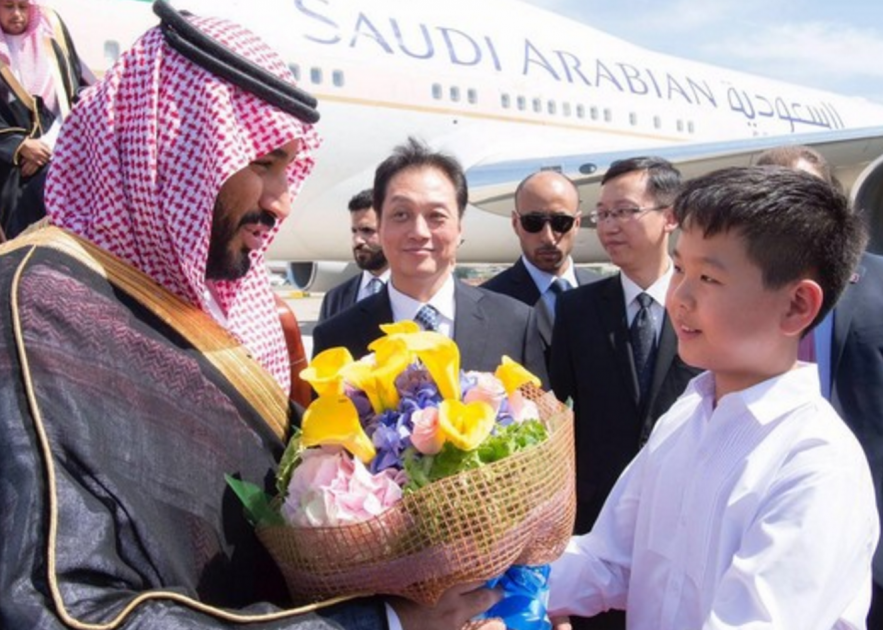
KSA, China get down to business
Deputy Crown Prince Mohammed bin Salman, second deputy premier and minister of defense, arrived here on Monday from Islamabad.
He is on an official visit to China upon the directive of Custodian of the Two Holy Mosques King Salman, and in response to the invitation of the Chinese government.
Prince Mohammed was received at the Beijing airport by Chinese Vice Foreign Minister Wang Chao, Chinese Ambassador to Saudi Arabia Li Huaxin, a number of Chinese government officials and members of the Saudi Embassy in Beijing.
The official delegation accompanying the deputy crown prince includes Minister of Finance Ibrahim Al-Assaf, Minister of Commerce and Investment Majid Al-Qassabi, Minister of State and Cabinet member Mohammed Al-Asheikh, Minister of Culture and Information Adel Al-Toraifi, Minister of Environment, Water and Agriculture Abdul Rahman Al-Fadli and Minister of Foreign Affairs Adel Al-Jubeir.
Also accompanying the delegation are Minister of Energy, Industry and Mineral Resources Khalid Al-Falih, Housing Minister Majed Al-Hogail, Minister of Telecommunication and Information Technology Mohammed Al-Suwaiyel, Chief of General Intelligence Khalid Al-Humaidan and a number of high-ranking officials.
Meanwhile, a number of commercial and investment deals between Saudi Arabia and China were signed during the Saudi-China Business Forum, which was held on the sidelines of the deputy crown prince’s visit, in Beijing on Monday.
One of the deals included an agreement between the Council of Saudi Chambers and the China Council for the Promotion of International Trade (CCPIT), while other deals were signed between the Saudi companies such as Al-Ajlan Group, Al-Jabr Holding, Al-Jeraisi Group and others with their Chinese counterparts.
Saudi ministers Al-Qassabi, Al-Falih and the deputy president of the CCPIT were among those who attended the forum.
The deputy president of the CCPIT touched upon the economic cooperation between the Kingdom and his country and called for expansion of this cooperation to wider horizons in a manner that serves the interests of the two countries.
He said there are promising investments in the Kingdom which could be an incentive for the Chinese business sector to invest. “China is considered the first (trade) partner with the Kingdom in terms of commerce and investment.”
Al-Qassabi thanked the CCPIT and Council of Saudi Chambers for organizing the forum to promote trade and investment partnerships between the two countries.
He said the Saudi-Chinese relations were witnessing substantial progress in all areas, notably in the economic, trade, investment, industrial and service fields. The deputy crown prince’s visit to China came to prove that, he added.
The Saudi Vision 2030 is a strong and ambitious vision based on the expansion of investments and partnerships between countries, he said, adding that China is the first trade partner for the Kingdom.
Al-Qassabi said the vision came to speed up the improvement of investment environment and its competitiveness at the global level and development of sectors that have not yet been fully exploited such as IT, housing, real estate, transport, mining, military industries and alternative energy.
He said the Kingdom has opened up foreign investment with 100 percent ownership in the commercial sector within certain regulations as one step toward realization of more stability in the country.
The minister said the Chinese business sector is seeking further opportunities to expand and grow in investment and production outside its borders.
The Kingdom is most suitable for the Chinese business sector where it (the Kingdom) will allow it to expand in the Middle Eastern and African countries, where “all potentials are available for investors to achieve high profitability rates with least risks in a competitive environment with advanced infrastructure.”
Al-Qassabi said that there is complete conformity between the Kingdom’s Vision 2030 and China’s economic belt of the Silk Road initiative where the Saudi Vision aims to change the unique and strategic location of the Kingdom into a global logistics center.
The minister said the Kingdom, represented by the Ministry of Commerce and Investment, will give top priority and exploit all potentials to ensure the success of Saudi and Chinese companies.
Al-Falih said the role assigned to his ministry will be redoubled with the partnership of the Saudi and Chinese business sectors.
He said Vision 2030, launched under the sponsorship of the Custodian of the Two Holy Mosques, comes complementary to the China’s economic belt of the Silk Road initiative launched by Chinese President Xi Jinping.
Through Vision 2030, the Kingdom is keen to diversify the economy and, at the same time, lead the world in the area of energy, he said.
Al-Falih said the Kingdom and China will have effective investment ties in the area of energy, but energy will not be the sole theme of the Saudi economy for bilateral relations between the two countries.
He urged the Chinese business sector to be proactive to invest in the industrial sector in the Kingdom.
In this context, the minister focused on value-added industries such as mining and petrochemical as well as auto, home appliances and technology, which will allow investors access mega and promising markets in the Middle East, Central Asia and Africa.
Al-Falih called on the Chinese business sector to invest in the mining sector, adding that his ministry is seeking to raise the share of the mining sector in the Kingdom’s gross domestic product (GDP). “This sector is open for foreign investors and will be opened wider in the future.”


























